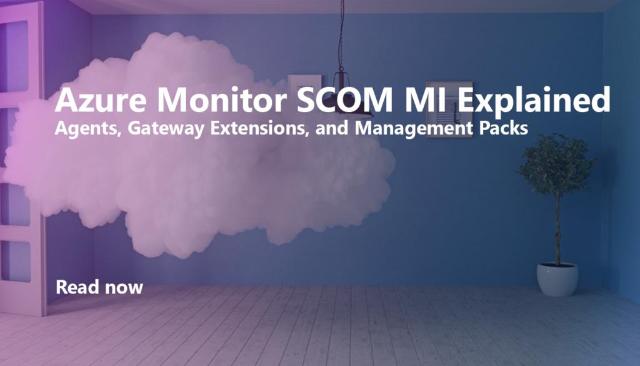Azure Monitor SCOM MI Explained
Azure Monitor SCOM Managed Instance (SCOM MI) is a cloud-based version of the System Center Operations Manager (SCOM), which allows you to monitor on-premises and cloud resources. In this context, Agent and Gateway Extensions in Azure Monitor SCOM MI and Management Packs (MPs) in SCOM serve different purposes but are both critical for monitoring your environment.
Agents, Gateway Extensions, and Management Packs in Azure Monitor SCOM MI
Agent Extension
Purpose: The Agent Extension in Azure Monitor SCOM MI is responsible for collecting monitoring data from the resources (servers, applications, etc.) and sending this data to Azure Monitor.
Functionality: It operates similarly to the SCOM Agent in on-premises environments but is tailored for cloud integration. The Agent Extension is installed on your monitored resources and communicates directly with Azure Monitor.
Advantages: This extension allows for seamless integration with Azure services and leverages the scalability and flexibility of the cloud. It’s easier to manage and update as it can be centrally controlled via Azure.
Usage: Mainly used in scenarios where you are monitoring hybrid environments or cloud-native workloads. It simplifies the process of connecting your on-premises resources to Azure Monitor through SCOM MI.
Gateway Extension
Purpose: The Gateway Extension in Azure Monitor SCOM MI is designed to facilitate secure communication between the on-premises environment and Azure Monitor.
Functionality: The Gateway Extension acts as a proxy or relay between the on-premises SCOM environment and the Azure Monitor service. This is particularly useful when direct internet connectivity from on-premises agents is not possible or desirable due to security concerns.
Advantages: It provides a secure communication channel, allowing you to safely monitor your on-premises resources without exposing them directly to the internet.
Usage: Ideal for organizations with stringent security requirements, needing to monitor on-premises resources via Azure Monitor SCOM MI without compromising security.
Management Packs (MPs)
Purpose: Management Packs are the core components in SCOM (both on-premises and in SCOM MI) that define how various resources are monitored.
Functionality: MPs contain the logic for discovering resources, collecting monitoring data, raising alerts, and generating reports. They include rules, monitors, views, and dashboards that are specific to the application, service, or technology being monitored (e.g., SQL Server, Windows Server, etc.).
Advantages: MPs allow you to extend the monitoring capabilities of SCOM to cover a wide range of products and services. They are customizable and can be tailored to meet the specific monitoring needs of your organization.
Usage: In both on-premises SCOM and SCOM MI, MPs are crucial for defining what is monitored and how it is monitored. They are essential for monitoring specific applications and infrastructure components, providing deep insights and allowing for fine-tuned monitoring configurations.
Key Differences
Purpose
Agent and Gateway Extensions focus on enabling and securing the connection between monitored resources and Azure Monitor in a hybrid or cloud environment.
Management Packs define what and how resources are monitored, providing the rules and knowledge for specific technologies or applications.
Scope
Agent and Gateway Extensions are specific to Azure Monitor SCOM MI and are used to integrate on-premises resources with cloud-based monitoring.
Management Packs are used in both on-premises SCOM and SCOM MI, focusing on the monitoring details for various applications and services.
Functionality
Agent and Gateway Extensions facilitate the communication and data collection from resources to the monitoring service.
Management Packs determine the monitoring content, such as performance metrics, health states, and alerts, for specific technologies.
Deployment
Agent and Gateway Extensions are part of the infrastructure setup and are typically deployed and managed via Azure.
Management Packs are imported into the SCOM environment (on-premises or MI) and can be customized or extended as needed.
Serving Distinct Roles
While both Agent and Gateway Extensions in Azure Monitor SCOM MI and Management Packs in SCOM are integral to the monitoring process, they serve distinct roles.
Extensions focus on connectivity and integration with Azure Monitor, while Management Packs concentrate on the content and logic of the monitoring.
About NiCE
NiCE offers specialized services and Management Packs designed to elevate your Microsoft System Center experience.
Our solutions, including SCOM Health Assessments and SCOM-centric monitoring tools, optimize IT infrastructure management across a wide range of applications and systems. With the largest set of Management Packs for SCOM, ongoing development, and out-of-the-box metrics, NiCE ensures efficient, secure, and comprehensive monitoring. Explore how our tailored solutions can enhance your operations with a quick demo and a 30-day free trial.

